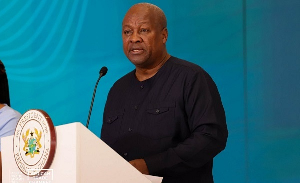The Ministry of Employment and Labour Relations has held a day-long sensitization and awareness-creation workshop on the Green Jobs Strategy in Accra for some selected journalists.
The workshop was organised at the Central Hotel, Ridge, Accra, on Thursday, January 25, 2024.
Gloria B. Noi, Director of Policy, Planning, Monitoring, and Evaluation (PPME), stated in an address read on behalf of the Ministry of Employment and Labour Relations that the negative impact of global warming and climate change has become increasingly visible around the world.
She said climate change has significant implications for human life if the government fails to implement measures to combat it.
She admonished the media to help raise awareness of the National Green Jobs Strategy and the transition from brown to green environments.
According to her, the Ministry of Employment
and Labour Relations and its partners are working together to develop a national green jobs strategy to maximise job creation potential in the emerging green economy.
She said there was an urgent need to identify the requisite green skills for relevance to the green economy.
She emphasises that everyone has a role to play in creating green jobs at the national and local levels.
A representative from SNV Ghana’s European Union-funded Boosting Green Employment and Enterprise Opportunities in Ghana (GrEEn) Project, Awudu Musa Dramani, noted in his presentation that they have provided funding of 150,000 euros for this project.
The National Green Jobs Strategy is crucial for Ghana due to the increasing impact of climate change on our lives and future generations, he noted.
He said the workshop was also important since it would help the media understand the strategy and what it entails and have a better understanding of educating Ghanaians.
He said green jobs involve finance, and his outfit is working in partnership with the ministry to develop strategies for raising the needed financing for the project.
He added that there was a need for them to also involve the private sector because if the private sector is not a leading activity, then there would be challenges.
He went on to reveal that there are several opportunities in the green job sector since it is not only limited to agriculture.
He said, with clear understanding, that we will know that there is no job that cannot be green.
He said that construction, electrical, and any job has a green job component.
“So we will need to understand the strategy and what it entails,” he said.
In 2020, SNV signed an MoU with the Ministry of Employment and Labour Relations to work together to create green jobs and provide youth employment at the local level to support Ghana in its transition into a circular economy.
Through the GrEEn project, SNV focuses on improving the employability and entrepreneurship capabilities of youth in the agriculture, energy, and WASH sectors, in addition to supporting small and medium enterprises that contribute to green and climate-resilient local economies with incubation and/or acceleration.
Gideon Mankralo, the NPC at the International Labour Organisation, which is also a partner, said the threats of climate change and its effects pose massive challenges to governments both in developed and developing countries.
He said the Green Jobs Initiative of the ILO encourages governments, employers, and workers to develop policy tools aimed at achieving an environmentally sustainable process of development alongside the creation of decent jobs.
Green jobs, he added, are economically viable employment that reduces environmental impacts to sustainable levels.
These types of jobs could include activities that promote and restore ecosystems and biodiversity, reduce consumption of energy, materials, and resources, de-carbonise the economy, and minimise or avoid the generation of waste and pollution.
According to him, the strategy has been developed to create platforms, develop capacities, and institute measures that would organise and harmonise ongoing green interventions through effective coordination.
He informed the journalists that the strategy adopts a multi-sectoral approach to ensure the effective delivery of goods and services by specialised state and non-state actors through the implementation of measures that support the growth and expansion of the green economy in Ghana.
Mr. Ernest Berko, Deputy Director of Policy, Planning, Monitoring and Evaluation, stated that the National Green Job strategy aims to implement safety measures that transition from the brown to the green world.
Berko explains that the National Green Jobs strategy, developed by MELR and stakeholders, aims to reduce job losses and maximize the potential of the green and circular economy for creating decent green jobs in Ghana.
The main goal is to promote green job creation through effective policy coordination across sectors.
He emphasized that transitioning from brown to green is a conscious move that maximizes job creation potential in Ghana while minimizing job losses.
The Ghana Green Jobs Programme outlines key critical routes for promoting green jobs, including inter-sectoral approaches, good collaboration, and enterprise development.
The country’s top five emerging sectors for enterprise development and job generation have been recognised.
The sectors included renewable energy, agriculture, waste management, recycling, construction, ecotourism, and nature-based tourism.
Jobs in these industries include pico and wind hydro, solar home systems, solar panels, nuclear energy, organic fertiliser, pesticides, forestry, soil management, collection and sorting, waste processing, natural building materials, ecotourism, and ecologically friendly hotels and homestays.
General News of Friday, 26 January 2024
Source: rainbowradioonline.com













